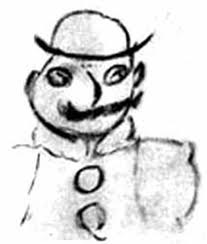Sociologism Literature 2000-2025
Harry Schiller on the Beneath Behavioralism School of Literature
Dear Republic,
We had an embarrassment of riches with the “Learnings” contest prompt — and then whatever the opposite of “an embarrassment of riches” is with the “literary schools” prompt. But Harry Schiller did submit this classy essay, really putting a lot together on what the dominant literary style is of our era.
-ROL
SOCIOLOGISM LITERATURE 2000-2025
Modernism understood Leopold Bloom. He was a smart but impotent man. Most of what I remember from Ulysses is Dublin. Its streets and neighborhoods and corners. Its messiness. Its bars and their history. The ghosts of past Dedalus’ and Blooms’ sitting in every restaurant and store. Those histories are described as place, as physical architecture.
Were James Joyce a woman who graduated from The New School’s MFA program in the past twenty years, he would have written a different book. The book would have been about the traumas of Blooms’ Jewish ancestors. It would have been about masculinity, constructed through drinking and carousing and then about the deconstruction of that masculinity. These forces would be named and ruminated on and interrogated. What is the origin of this behavior? Does it reverberate through the generations? Can I make that explicit with time jumping? By telling multiple stories?
Of course, Ulysses is about all of those things. Joyce was a bright guy. He knew what forces had shaped these men's lives. He certainly perceived the position of women correctly in the final chapter, concerning one Molly Bloom. The modernist writes like a sharp curious eagle, eyes x-raying the city in which he lives. The sleeping stories of the past and the bubbling forms of frustration and conflict ready to rise from their gestation and unmake the future. Mr. Joyce sees those things, thinks about those things. His novels and stories foreground people and their experience of the present, however. The forces work in the background, but he knows that naming them will spoil the fun, the life.
English-language literature in the early 21st century has undertaken a new task: to simultaneously explain the world sociologically, lament the imperfection of the West, and provide therapy to the main character as they are tossed by the unjust forces that hit them like waves. I will call this “beneath behaviorism.” The trend stands for examination, for understanding sociology. “It is not enough,” this school says, “to write behavior and place. We must move into the head of our characters and watch them step back and back and out and struggle to explain all of this. That struggle, that quest to understand one's life sociologically. That is the stuff of great literature!”
Take Middlesex, Jeffrey Eugenides’ 2002 novel about a hermaphrodite. This novel is one of the most acclaimed of 21st century American literature. Why? Does it illuminate life for a teenage girl in America? Does it find its characters on a street corner at a place and time and watch as they make their way in the maze of economic and social preconditions before them? No, it is about an unusual girl. A girl with family trauma, genetic uniqueness, unbounded self-examination. The novel is supposed to be about being an outsider. But it explains the process by which a young person becomes an outsider so exhaustively that it misses what is most viscerally true about being an outsider: a helplessness. How do I fit in? Do I want to if that means I choke off my distinctiveness?
Or I will look at Anna Solomon’s The Book of V, a 2019 novel which received numerous book award nominations. It’s about the transtemporal bonds between three women: the Persian Jewish Queen Esther, an Episcopalian wife to a politician living in a nondescript DMV area home, and a Brooklynite mother attempting to be a good mother, a good feminist, a good wife, and a real individual in the 21st century. The book bends each strand of its narrative to complement the others. It is so planned out, so understood. The unjust forces which limit each women's choices are so extensively lamented and analyzed and raged against that the book itself does not offer us the little moments of freedom, of choice which we all feel in our life. Should I move here or there? Should I direct my love to this person or wait?
This 21st century literature becomes an unending recursive dialogue between the protagonist and her own past. She wonders what the deepest socialized behavior which she was obeying in the past was. Why she fell for this man. Why she took this job. Why she failed to speak up. Why she lives in this neighborhood. She traces back the economic forces, the cultural consensuses, the learned behaviors that lead her to this point. She laments her contingent life. She feels grateful for unchanging, timeless things. These novels often reach for the eternal. Some of them are explicitly about analogizing women's lives today to a woman's life in the Persian Empire or in the Dark Ages in Europe or in Colonial America (see Lauren Groff's The Vaster Wilds, Anna Solomon’s The Book of V, and Ali Smith’s How to Be Both).
Literature becomes less sensory. Without a sensual dimension, novels become more and more like intellectual exercises, using the same stale vocabulary already used in history books and sociological theories.
In this way of doing things, I don’t feel like I was there at the parties on Long Island thanks to F. Scott Fitzgerald. I no longer feel the thrill of a new freedom in Louisiana courtesy of Kate Chopin. Meetings happen, partings too. They are narrated and then they are examined by the writer. It is a kind of showy literature, this 21st-century trend. It seems to come out of people who majored in literature at college or who grew up reading book reviews and wanted to bring the recursive and ever-questioning sociological analysis that reviewers in The New York Times brought to the reviews into literature itself. So this has been an age of detachment — retreat further and further from the stuff of life which novels can invest us in and more and more into the realm of the mind. Into the mirror where we examine the shapes and forms and dimensions of our self-delusion, our self-belief and those present forces (capitalism, patriarchy, the hangover of Christianity) that swirl around us blocking certain paths which our soul would be grateful to walk and shunting us towards other gender roles and jobs which do not reward us.
This era of literature is fundamentally different even than previous novels about class and gender. Jane Austen, Kate Chopin, Leo Tolstoy, and many others have written about people whose movement was limited. People whose desire to break free or to fulfill their gender roles bumped up against the customs, economic structures, and moral social judgments of their time. But Anna Karenina was not a peruser of self-help books. Elizabeth Bennett did not question why she wanted the thing she did. She swelled with pride whenever she felt herself diminished and then swelled with affection when she recognized the humanity beneath the prejudice of the man who had insulted her pride. The book is about the swelling, the waves of motion that pass over her. It is about the detail, the awkward conversations, and then the unrestrained admissions and affirmations of love and affection that accompany those forces. Jane Austen was not a modern theorist seeking to name and graph the forces beneath the mind, beneath the senses, beneath the archetypes of the man and women in love. She was someone who believed in love. Jane Austen, a deep romantic, was curious about how it felt to stumble along the path to love before straightening proudly and looking your lover in the eye. Today's writers, most of whom are women, do not share that romantic vision with Jane Austen. They want to constantly look, turn back on their own mind and their own person. Through writing about young women, which they themselves once were, they want to pick apart the components of a woman's psychology and discover more thoughts.
I do not like this. This 21st-century panic of anti-behaviorist analysis has covered the beautiful romantic stained glass windows with shrouds of linen covered in graphs and charts and dictionaries of new analytical terms. I don't like it because it erects a filter, an ideological hand-me-down filter through which we must try to see clearly the very stuff of life and through which we must feel our emotions and then examine those feelings.
I don't like this because it feels dull. It feels limiting. It feels as though I am not being trusted to find life as it is and read from it what I will. I dislike it because the writing is showing off. What can come after anti-behaviorism? I think it will be driven by readers’ demand. A demand to read books that express awe at our new age, in which we will be interacting with robots and AI routinely. In which we will have a broader vocabulary to describe things that we love about people. Things other than their height, their job, their income, and the metrics that we can see on a dating app. I think it will come because of a demand to find life surprising again. Perhaps it will take another century or 75 years for this new dispensation to arrive. I certainly hope something does come after this. This literary school has produced many commentaries on life in the 21st-century but it has not produced many great novels.
Harry Schiller is a writer and photographer living in the Berkshires. He has been published in Chronogram. He writes poetry and criticism at the Substack
.






I enjoyed this essay. Wondering if you have examples of contemporary fiction that avoid the excess of introspection, where the interior dialogue is what passes through the mind of the character rather than being captured there to be analyzed as if the character is in a therapy session. If I've captured your meaning correctly.
Maybe this problem began when writers left the streets and hid in the academy.